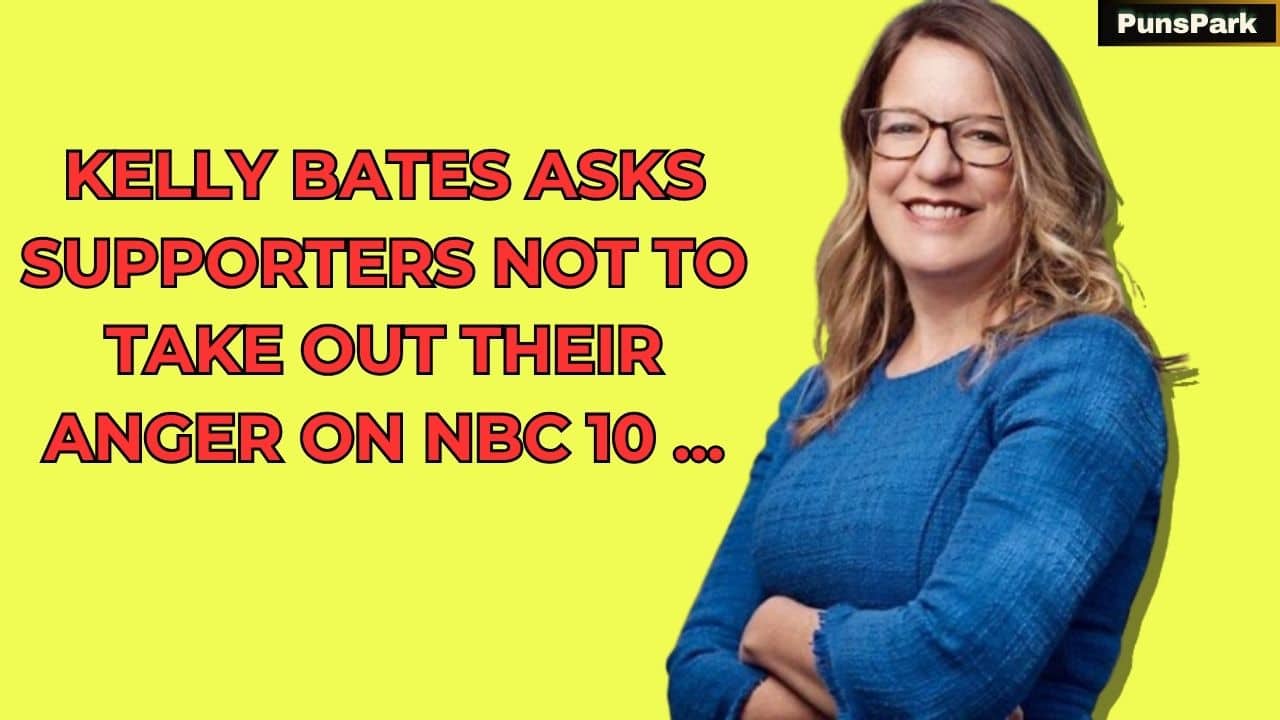Kelly Bates Asks Supporters Not To Take Out Their Anger On NBC 10: In an unexpected turn of events that shocked Rhode Island viewers, beloved meteorologist Kelly Bates departed NBC 10 after 23 years of service, leading to a wave of public outcry across social media.
What made this story remarkable wasn’t just the abrupt ending to her long career, but rather her surprising response to the controversy that followed.
Instead of fueling her supporters’ righteous anger, Bates took the high road, requesting that fans direct their energy toward positive engagement rather than hostility toward her former employer.
This article explores the situation, its broader implications, and why Bates’ response offers lessons in professionalism and grace during difficult conflict.
The Unexpected Departure
On a seemingly ordinary September day in 2021, Rhode Islanders learned that one of their most trusted weather forecasters would no longer appear on their screens.
Kelly Bates, who had become a household name and trusted voice during hurricanes, blizzards, and daily forecasts for more than two decades, announced her departure from NBC 10.
The news broke not through an official station announcement or celebratory send-off befitting a 23-year veteran, but through a brief social media post from Bates herself:
“I wanted to let you know that NBC 10 and I were unable to come to terms on a new contract, and they have decided to move forward without me.”
The brevity and timing of the announcement raised immediate questions. Had there been a disagreement?
Was this another case of a female broadcast meteorologist being pushed aside?
The lack of transparency from the station only fueled speculation among viewers who had invited Bates into their homes for decades.
Who is Kelly Bates?
To understand the intensity of the public reaction, one must first understand who Kelly Bates is to Rhode Islanders.
Far more than just a weather presenter, Bates established herself as a cornerstone of local media and community engagement.
Starting her career at NBC 10 in 1998, Bates quickly became known for her accessible approach to meteorology, explaining complex weather patterns in ways viewers could understand and apply to their daily lives.
Her authentic on-camera presence and genuine concern during severe weather events earned her the trust of viewers across Southern New England.
Professional Achievements and Community Impact
| Year | Achievement/Contribution |
|---|---|
| 1998 | Joined NBC 10 as meteorologist |
| 2004 | Received AMS Seal of Approval |
| 2011 | Led award-winning coverage during Hurricane Irene |
| 2015 | Launched “Weather Week” educational program for local schools |
| 2018 | Honored with “Trusted Voice” award by Rhode Island Broadcasters Association |
| 2020 | Provided critical information during COVID-19 pandemic |
Beyond the camera, Bates established herself as a fixture in community outreach, visiting schools to educate children about meteorology, participating in charity events, and representing the station at local fairs and festivals.
This deep community involvement transformed her from a simple television personality into someone viewers considered almost family.
The Announcement That Shocked Viewers
The abrupt nature of Bates’ departure created an information vacuum that viewers quickly filled with speculation.
The timing coming shortly after her 23rd anniversary with the station struck many as particularly callous.
“After 23 years at NBC 10, I am no longer employed there,” Bates wrote in her initial post. “I have loved forecasting weather for you and Rhode Island is my home.”
The broadcasting network’s initial silence spoke volumes. While Bates took the high road with a simple announcement, the station initially offered no public statement, tribute, or explanation a stark contrast to how other departing personalities had been treated.
This lack of clear messaging only intensified the growing controversy.
Industry insiders noted several troubling aspects to the situation:
- The timing during hurricane season, when experienced meteorologists are most needed
- The absence of a formal on-air goodbye for a two-decade veteran
- The complete silence from station management about her contributions
This perfect storm of poor communication strategy created an environment ripe for viewer backlash.
The Viewer Backlash
The response from Bates’ fans was swift and overwhelming. Within hours, social media platforms erupted with expressions of shock, disappointment, and anger. Hashtags like #BringBackKelly and #BoycottNBC10 began trending locally.
Social media influence revealed itself powerfully as thousands of comments flooded NBC 10’s digital platforms:
- Facebook posts unrelated to Bates were hijacked with comments demanding explanations
- Twitter users tagged the station and parent company executives demanding answers
- Online petitions gathered thousands of signatures within days
- Local businesses posted messages of support for Bates
- Several prominent Rhode Island figures publicly questioned the decision
The intensity of the public sentiment surprised even media observers. Comments ranged from expressions of personal loss to accusations about ageism and sexism in the media industry.
Some viewers publicly pledged to change channels, while others demanded boycotts of station advertisers.
Kelly’s Surprising Response: Choosing Grace
Just as the social media outrage reached fever pitch, Kelly Bates did something unexpected that changed the narrative entirely.
Rather than capitalize on the wave of support to criticize her former employer, she posted a message asking for calm and respectful discourse.
In a Facebook post that demonstrated remarkable restraint and professionalism, Bates wrote:
“I appreciate all of your kind words and support more than you will ever know. But please don’t be angry or nasty. That is not who I am, and it doesn’t reflect who I want my supporters to be either. Life brings change, and this is just one of those moments. Let’s all move forward with kindness.”
This message reflected several aspects of reputation management that distinguished Bates’ approach:
- Acknowledgment of supporter feelings without fueling them
- Clear boundary-setting about acceptable forms of support
- Modeling the communication style she hoped others would adopt
- Refusing to engage in public criticism of former colleagues
Media experts noted that this response demonstrated extraordinary emotional intelligence and professional maturity during what was undoubtedly a personally difficult time.
Contract Realities in Broadcasting
To fully understand the context of Bates’ departure, it’s important to examine the often opaque world of media contracts that govern broadcasting networks and their on-air talent.
Television contracts typically include:
- Fixed terms (usually 2-5 years)
- Exclusivity clauses limiting outside work
- Image rights provisions
- Performance metrics tied to ratings
- Non-compete clauses restricting future employment
- Renewal options favoring networks
What viewers often fail to understand is that these contracts create inherent power imbalances. While popular personalities can leverage their audience trust during negotiations, ultimately media organizations hold significant advantages.
Broadcasting decisions about talent are typically driven by multiple factors beyond the control of on-air personalities:
- Rating performance in key demographics
- Salary benchmarks across markets
- Strategic repositioning of network identity
- Budget constraints from parent companies
- Long-term programming strategies
Industry analysts suggest that Bates likely faced the common dilemma of accepting less favorable terms or standing firm on her value the latter choice ultimately resulting in her departure.
The Power Shift: Social Media vs. Traditional Media
The Bates situation exemplifies how digital platforms have fundamentally altered the power dynamic between broadcasting networks and viewers.
In previous decades, a network could simply announce a personality change and viewers had little recourse but to accept it.
Today’s landscape offers viewers unprecedented platforms for public discourse and organizing:
- Social media campaigns can quickly mobilize thousands of supporters
- Direct messaging to executives bypasses traditional gatekeepers
- Rating impacts can be immediately measured and reported
- Alternative platforms allow personalities to maintain audience connections
- Public pressure can influence advertiser behavior
This democratization of media relations creates both opportunities and challenges. While networks must now consider audience reaction more carefully, the intensity and sometimes toxic nature of online criticism can create difficult environments for constructive resolution.
In Bates’ case, the outpouring of support demonstrated her true value to the community but her call for restraint showed understanding that online hostility ultimately damages all parties involved.
NBC 10’s Response to the Controversy
Facing mounting public discontent, NBC 10 eventually issued a statement acknowledging Bates’ departure, though many viewers found it inadequate:
“We thank Kelly for her dedication to NBC 10 and her commitment to keeping our viewers informed with critical weather updates throughout her years of service.”
The brevity and timing of this response coming days after the public outcry began exemplified poor crisis management from a public relations perspective.
Rather than addressing viewer concerns directly or celebrating Bates’ contributions meaningfully, the statement appeared formulaic and reactive.
Industry analysts noted several missed opportunities in the station’s handling of the situation:
- Lack of an on-air tribute segment celebrating her career
- Absence of executive comments reflecting her value
- No acknowledgment of viewer concerns
- Minimal engagement with the community reaction
- Delayed and perfunctory official response
These missteps created a textbook example of how not to manage a high-profile personnel transition, particularly with a beloved community figure.
The Broader Conversation About Age and Gender in Media
Bates’ departure didn’t happen in isolation, but rather against a backdrop of ongoing concerns about how women particularly those over 40 are treated in television news.
Many supporters pointed out that Bates’ departure seemed to follow a troubling pattern across the media industry.
Research data shows concerning trends:
- Female news personalities face earlier career plateaus than male counterparts
- Women in broadcast media face more appearance scrutiny than men
- Contract renewals for women over 40 show statistical disadvantages
- Salary disparities increase with age for female broadcasters compared to male peers
While the specific details of Bates’ contract negotiations remain private, many viewers connected her situation to these broader issues, raising important questions about equity in media and representation.
Bates herself never publicly suggested discrimination played a role in her departure, maintaining her professional stance throughout.
This restraint earned her additional respect from industry observers while allowing supporters to advocate for broader change.
What’s Next for Kelly Bates?
Following her departure from NBC 10, speculation about Bates’ next career move generated significant interest.
Her decades of experience, meteorological expertise, and massive public support positioned her well for several potential paths:
- Joining a competing local station (subject to non-compete agreements)
- Transitioning to digital or streaming weather platforms
- Expanding her educational and community outreach work
- Leveraging her following for independent content creation
- Consulting on weather communication and emergency preparedness
Industry experts noted that Bates’ graceful handling of her departure only enhanced her already strong personal branding, making her an attractive candidate for future opportunities.
Her demonstrated loyalty, professionalism, and connection with viewers represent invaluable assets in media markets increasingly focused on authentic engagement.
In a subsequent social media post, Bates hinted at future plans while expressing gratitude:
“This isn’t goodbye it’s just a forecast for changing conditions. I’m exploring several exciting opportunities and look forward to connecting with this amazing community in new ways soon.”
How Fans Can Constructively Show Support
Bates’ request for respectful interaction rather than online hostility raises important questions about how viewers can effectively support media personalities they value.
Media experts suggest several approaches to constructive actions:
- Follow personalities across platforms to support their next ventures
- Engage positively with their content rather than attacking former employers
- Advocate for industry changes through constructive feedback to networks
- Support local media while encouraging inclusive practices
- Practice media literacy by recognizing the business realities behind decisions
Most importantly, viewers can honor Bates’ wishes by maintaining the same level of professionalism and grace that she demonstrated. As one longtime viewer commented:
“Kelly taught us about weather for 23 years, but her final lesson about dignity and class might be the most important one.”
This perspective reflects how Bates’ handling of the situation transformed a potentially ugly public dispute into a teaching moment about respectful discourse in an increasingly divisive media landscape.
Key Takeaways: Media Literacy in the Digital Age
The Bates situation offers several valuable lessons about media literacy in today’s complex information environment:
- Look beyond announcements to understand context and background
- Question generic statements from networks about personnel changes
- Separate facts from speculation when considering motivations
- Consider business realities behind popular personality decisions
- Recognize the power of constructive audience feedback
- Understand how social media can both help and harm positive outcomes
Perhaps most importantly, viewers witnessed a masterclass in crisis communication not from the network, but from Bates herself.
Her ability to acknowledge supporter feelings while channeling them toward productive ends demonstrated emotional intelligence that corporate communications often lack.
FAQs
Why did Kelly Bates ask her supporters not to direct anger at NBC 10?
Kelly Bates urged her fans to channel their frustration in positive ways instead of targeting NBC 10. She emphasized that her colleagues at the network were not to blame for her departure and that constructive communication was key to resolving the situation.
What was the public’s reaction to Kelly Bates’ departure from NBC 10?
The news of Kelly Bates’ sudden departure sparked an emotional outcry from her loyal supporters, many of whom expressed anger and confusion on social media. The lack of transparency from NBC 10 fueled speculation and led to calls for answers.
How did Kelly Bates respond to the growing backlash against NBC 10?
In the face of growing public frustration, Kelly Bates took to social media to ask her fans not to lash out at NBC 10 or its staff. Instead, she advocated for respectful, positive discussions and urged followers to focus on constructive actions rather than hostility.
What message did Kelly Bates share with her fans in response to the controversy?
Kelly Bates’ message was clear: she encouraged her supporters to respect the situation and engage in productive conversations. She stressed that online hostility would only escalate the issue, while empathy and respect could help create a more positive atmosphere.
How can fans show support for Kelly Bates in a positive way?
Kelly Bates wants her fans to support her by refraining from anger-driven actions. Instead, they can engage in respectful dialogue, avoid spreading misinformation, and advocate for positive changes through calm, solution-focused discussions.
What can viewers learn from Kelly Bates’ response to the situation with NBC 10?
Kelly Bates’ calm and professional response teaches viewers the value of handling frustrations with respect and empathy. It highlights the importance of focusing on understanding and communication rather than letting negative emotions drive the conversation.
Final Thoughts: Kelly Bates Asks Supporters Not To Take Out Their Anger On NBC 10
The Kelly Bates situation represents a fascinating case study in the evolving relationship between media organizations, their talent, and increasingly empowered audiences.
While broadcasting networks still hold significant power in contract negotiations, the swift and powerful public response to Bates’ departure demonstrates how audience trust has become an increasingly valuable currency.
Bates’ remarkable response asking supporters not to direct anger toward NBC 10 stands as a powerful example of professionalism in an era often defined by outrage and division.
By choosing empathy over animosity, she demonstrated precisely the qualities that made her beloved by viewers for over two decades.
For media organizations and personalities navigating similar transitions, the lessons are clear: transparency, respect, and genuine appreciation for audience investment can transform potentially damaging situations into opportunities for growth and goodwill.
As for Kelly Bates herself, her weather forecast may have changed, but her impact on Rhode Island and the standards she set for media professionalism will continue influencing both viewers and industry practices for years to come.
Read more knowledgeable blogs on Puns Park

Philipp Engel is a master of wit and wordplay, dedicated to crafting pun-filled content that brings smiles and laughter to readers. With a knack for turning ordinary phrases into extraordinary humor, Philipp shares clever pun guides to brighten your day and sharpen your sense of humor.







